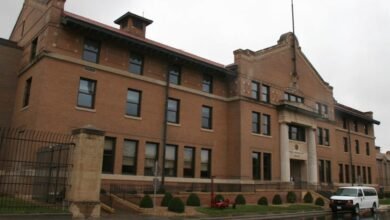
Red Lake Nation College on Thursday celebrated the opening of its new Minneapolis location, with music and applause filling the air as supporters gathered to mark one of the first times an accredited tribal college has set up in a U.S. city.
“It’s really hard to do. If it was easy, it would have been done a long time ago,” College President Dan King told a crowd of tribal members, government officials and others packed into the new building on Third Street, across from U.S. Bank Stadium. “Today is a great day for celebration.”
Music played as a long list of speakers made their way up to a podium to talk about the obstacles they had to overcome to open a Minneapolis site and their hopes for how it might transform students’ lives.
Minnesota has long reported disparities in higher education. About two-thirds of adults living in Minnesota have some type of college degree, but the figure among American Indians is closer to one-third, according to data kept by the state’s Office of Higher Education.
While the state has a goal to close those gaps by 2025, Office of Higher Education Commissioner Dennis Olson acknowledges it’s “a moonshot.” Still, he says, the state is committed to making progress and sees projects like this one as a crucial step in the right direction.
“We focus on primarily access and affordability and, of course, attainment, and this new site here in Minneapolis certainly has the potential to greatly impact all three of those,” Olson said.
There are about three dozen tribal colleges in the United States and few have a significant presence in cities. Oglala Lakota College has a location in Rapid City, S.D. Others are working to get accreditation for their urban programs, including one in Sacramento, Calif.
The Red Lake Band of Chippewa Indians opened the two-year tribal college on its reservation in 2001 in hopes of providing a closer option for tribal members who wanted to take classes. Today nearly half of the tribe’s 16,000 members live off the reservation and most of those people live in the Twin Cities metro area, said King, one of the tribe’s hereditary chiefs.
“That’s what brought us here,” King said. “We were just serving our own members.”
Red Lake Nation College began offering classes in Minneapolis three years ago, hosting them out of the tribe’s embassy in Ventura Village. Its new building has dedicated classrooms, a kitchen space, stations for setting up laptops, and technology designed to hold classes both in-person and online. College leaders plan to rent out a rooftop event space in hopes of bringing in extra revenue. The project cost just over $16 million, about $3 million of which was provided by the state.
Tribal colleges “serve a unique market niche that nobody else serves,” King said. The average age of a student at Red Lake Nation College is 29 years old. About 80% of the students are the first in their family to go to college. Many of the students are women who have children and juggle jobs as well.
“They’re overcoming a lot more than an average student,” he said.
Summer May, 20, graduated from Red Lake Nation College earlier this year with an associate degree after taking classes at the temporary Minneapolis location. She’ll head this fall to Augsburg University, where she hopes to earn a bachelor’s degree in environmental studies with a focus on American Indian studies.
At Red Lake Nation College, May said she had Indigenous instructors for the first time. She was able to connect with her culture, despite being more than four hours away from the reservation.
“A lot of urban Natives feel disconnected from their roots. A lot of us are trying to find access to our culture,” May said. “To physically have a site here is such a huge step in the right direction to bringing all of these Indigenous peoples who are in the city back to their culture and their roots.”
Source link



